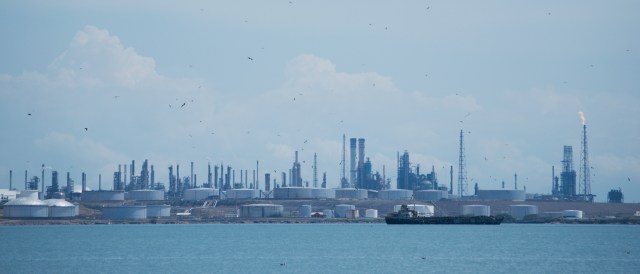What is holding Latin American countries back from reducing carbon emissions? Sandra Guzman points to the central role that fossil fuels play in key economies of South America. With the discovery of non-conventional sources of fossil fuels in countries like Brazil and Mexico, tackling an energy transition might become even more challenging.

The resource curse strikes again – an oil refinery in Venezuela. (Photo by Génesis García, CC BY-SA 3.0)
The diversification of the energy matrix in order to transition from fossil fuels towards renewable energy is a fundamental key to addressing climate change, because an energy sector based on fossil fuels is a major source of the greenhouse gases emissions that alter the climate system, according to the Intergovernmental Panel of Climate Change (IPCC, 2013). However, the transition towards cleaner energy is becoming more difficult. Why is that so?
There is not a single answer; instead there are three key issues. First, the Latin American fossil fuel industry is one of the most powerful in the world, and there is little willingness of producer countries to reduce their income for the benefit of the environment. Second, the consumption of fossil fuels is increasing around the world, which is associated with the increase in income in countries such as the US and China. Third, even though reserves of fossil fuels are decreasing, there are now non-conventional sources of fossil fuels that are considered “alternatives,” such as shale gas.
The global scenario is not particularly optimistic, and people think that this is predominantly the fault of major emitters such as the United States and China. But are they the only ones responsible for this environmental devastation? Can their actions be regarded as the main driver of climate change, separate from the rest of the world? Let’s analyse the role that the Latin American region is playing in this chess game.
Latin America is one of the most variable regions, with a mix of cultures and diverse ideas on social and economic development. Latin America has around 590 million inhabitants, with a GDP of $5,655 billion USD according to the World Bank in 2014, contributing 9% of the global greenhouse gas emissions (ECLAC, 2014). There are at least three countries that could be judged for their contributions to the global climate problem: Brazil, Venezuela and Mexico. According to the UN Economic Commission for Latin America and the Caribbean (ECLAC), Brazil, Mexico, Venezuela and Argentina contributed to 80% of the total emissions of the Latin American region (ECLAC, 2014).
Brazil is one of the most advanced economies in the region, especially in the field of technology. The country originally had ambitious plans to transition towards low carbon development. However, this was before it found the treasure box “Presal”, a very large reserve of oil. The Presal increased Brazil’s oil production by 500,000 barrels per day, tripling production since 2012 and representing one quarter of production of the Brazilian oil company Petrobras. Brazil continues to defend its position that OECD countries should pay their historical dues regarding climate change while less developed countries have the right to keep growing and emitting.
Venezuela has increased its proven oil reserves to a total of 298.350 millions of barrels. According to its Oil Ministry, Venezuela is the OPEC country with the most oil reserves in the world. Analysts suggest that Venezuela has enough oil for the next hundred years. Yet at the same time, Venezuela has announced its commitment to climate change mitigation by hosting the Pre-COP social meeting in July 2014. In reality, Venezuela is part of the ALBA (Alianza Bolivariana para los Pueblos de Nuestra América) group, which disagrees with the notion of reducing emissions according to the common but differentiated responsibilities principle.
Mexico, on the other hand, has played an active role in combating climate change. The country has set a reduction level of 50% of its emissions in 2050 and 30% in 2020 as part of its energy reform that took place in 2013. Even though the reform calls for sustainable development, many policies are favourable to the fossil fuels sector. This is because the energy sector (electricity and hydrocarbons) is generally open for private investment, with the exploration and exploitation of shale gas as a key goal. However, according to the Special Programme of Climate Change of the Mexican government (PECC), energy reform and the exploitation of shale gas in Mexico could actually lead to an increase the greenhouse gas emissions, which means that the reform would actually go against the national climate commitment.
The above countries have yet another important international dimension: Venezuela and Brazil have signed a series of oil deals with China; Mexico is receiving support from the United States for its domestic exploration of shale gas. These countries thus play an important role in the international energy chess game, not only on international energy markets but also in the global emissions.
Sandra Leticia Guzman Luna holds a Masters Degree on Environmental Policy and Regulation from the London School of Economics and Political Science, she studied International Relations at the University of Mexico (UNAM), and is a specialist in Environmental and Energy Management from the Latin-American Social Science Institute (FLACSO).